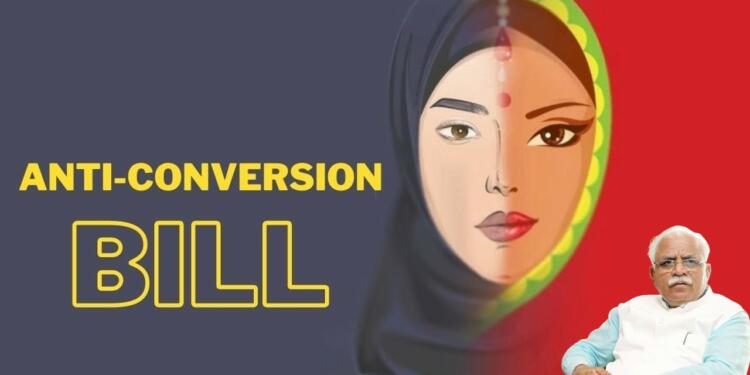- Amidst the Congress walkout, the Manohar Lal Khattar government passed an anti-conversion bill in Haryana
- Congress alleged that it will divide the society leading to more problems for men engaged in inter-religion marriages
- Congress will try every measure to enable change of demography, for its benefit, apparently ‘in the name of love’
For the last few years, Forced religious conversion has been one of the hotly debated issues in national politics. Congress has been on the other side of the coin, sometimes denying even the existence of the phenomenon. Congress’ opposition to this was again observed in their walking out when the unlawful conversion bill was being discussed in the Haryana assembly.
Anti-Conversion Bill passed in Haryana
Haryana Government has passed the colloquially termed anti-conversion bill in the state. As usual, both Congress and BJP were not on the same footing and the Gandhi family-led party vehemently opposed the bill. Initially, they put forward their rationale behind their opposition to the bill, however, when the Manohar Lal Khattar government responded to their qualms, the party staged a walkout from the assembly.
The anti-conversion bill aims to prohibit religious conversions which are effected through misrepresentation, force, undue influence, coercion, allurement or by any fraudulent means or by marriage or for marriage by making it an offence. It is pertinent to note that the bill does not put a restriction on someone’s freedom to choose their religion. It restricts only those elements who force someone to change their religion through fraudulent means.
The key aspects of the anti-conversion bill
- If a person accuses someone of converting him/her through proscribed means, then the accused will have to provide evidence that he/she hasn’t done it.
- If the accused has forcibly converted minors, women, or persons belonging to SC/ST community, then he will be subject to harsher punishment.
- If a person has married someone by concealing his/her religion, then that marriage can be declared null and void.
Read more: Haryana is set to implement “Anti-conversion bill” in the state
Congress cited the danger to men
When the anti-conversion bill was tabled for discussion in the state assembly, Congress decided to oppose it right from the beginning. Former Chief Minister Bhupinder Singh Hooda, a member of the party that draconian women-centric laws which are scaring men away from engaging with females in the modern world said that the bill will lead to disputes in couples of inter-religious marriages.
Forgetting his party member Renuka Choudhary’s misandrist stance, Hooda argued that after one month of marriage, the wife should not be allowed to file a complaint against her husband for forceful conversion. The party is effectively conveying that they care about a man’s respect and dignity only when he belongs to a particular religion.
Read more: Karnataka’s anti-conversion bill will throw the culprits behind bars for up to 10 years
Congress tried every trick in the book
Similarly, the opposition also urged that the bill would lead to communal division between followers of various religions. On the contrary, Manohar Lal Khattar, Haryana’s Chief minister argued that it was aimed at instilling fears among those who commit forceful conversions.
“A person can change religion as per his/her own free will, but it will not be allowed to happen to anyone forcibly. Action will be taken against such people if they convert religion by deceit or by giving any kind of greed. The purpose of this anti-conversion bill is to control forced religious conversion.”, said Khattar
Raghuvir Singh Kadiyan, another Congress leader went back in the past and invoked the partition to convince the BJP government to refer the bill to the select committee of Vidhan Sabha of the state. Similarly, Kiran Choudhary, another Congress MLA was found citing privacy and sanctity of marriage to stop the anti-conversion bill from taking the shape of law.
Read more: 20 years of ‘Gadar’: The film that changed the narrative of the partition of India
Congress’ line of arguments clearly states that they are not consistent over their stances regarding people from different communities. The party does not want everybody to be equal under the rule of law. Forceful conversion in the name of love is only detrimental to the majority Hindu community. Congress just signalled where its loyalty does not lie.
























